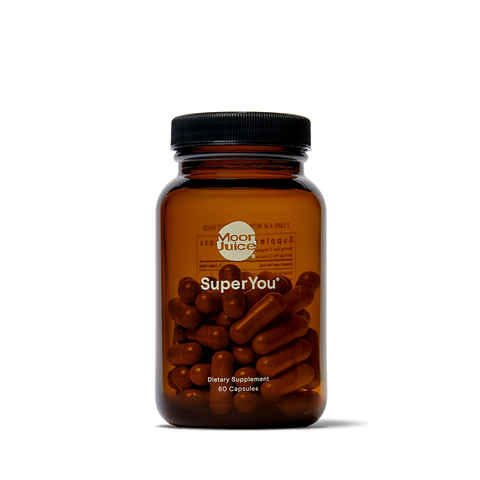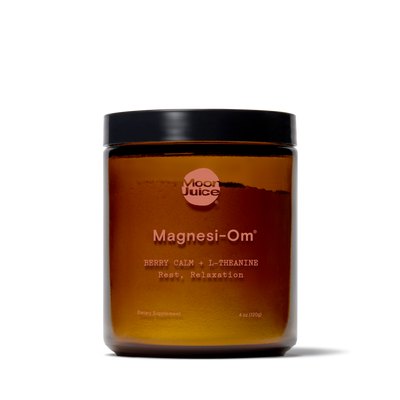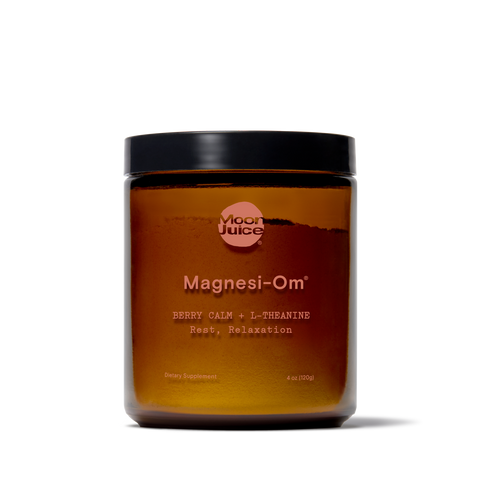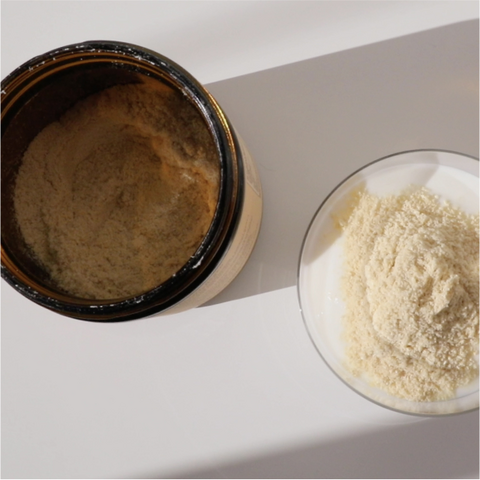If you’re seeking more calm in the midst of a busy day, you might be looking to natural supplements to soothe frayed nerves and provide steady focus. Two of the most helpful supports commonly found in stress relief supplements are Ashwagandha and L-theanine. So what are the primary differences, and which one’s better for your physical and mental health?
When considering taking L-theanine or Ashwagandha, it’s important to note that while the two are similar, they work by way of different mechanisms in your body. Specifically, L-theanine interacts with neurotransmitters in your brain, while Ashwagandha works by way of the HPA axis and the sympathoadrenal system.
If you’re deciding between L-theanine vs. Ashwagandha, keep reading to learn their primary benefits, how they work, and whether you can take them both together.
What is L-Theanine?
L-theanine is a naturally occurring amino acid (you might know amino acids as the building blocks of protein). Found in tea leaves—especially green tea (Camellia sinensis), and functional mushrooms, it’s known for its calming effects and has a long history of traditional use in the form of tea in China and East Asia.
Notably, green tea also boasts other beneficial compounds, like antioxidant polyphenols called catechins, as well as caffeine, all of which make it a popular herbal beverage for brain cognition, energy, healthy weight management, and other aspects of physical and mental health.
L-theanine itself was not discovered in green tea until 1949. The amino acid is often used for increased focus and enhanced mental function, as well as managing stress levels.
Though it’s easily consumed along with caffeine in your cup of green tea or matcha, you can also get L-theanine isolated as a natural supplement in powder or capsule form or mixed with other helpful herbs.
What is Ashwagandha?
Ashwagandha, or Withania somnifera, is an herb heavily relied upon in traditional Ayurvedic medicine. Native to India, the Middle East, and parts of Africa, its roots and leaves have been used for millennia to promote health. Over the last century, it’s also been considered one of the best adaptogens for stress.
In supplements, Ashwagandha is found in powder, pill, or tincture form, either on its own or mixed with other herbs and adaptogens. It’s prized for its high antioxidant content and as an herbal support for stress, physical performance, mood, mental focus, and more.
Similarities Between L-Theanine & Ashwagandha
Ashwagandha and L-theanine are both soothing tonics that help your body regulate and react to stress without causing drowsiness and support balanced energy without causing jitters. Here are some important commonalities between the two.
Stress Relief
Both L-theanine and Ashwagandha are used to help the body respond to stress, helping your body regulate stress without putting you to sleep.
By way of brain waves and neurotransmitters, L-Theanine has been shown to help your mind relax. This is why green tea can help you achieve smooth energy that isn’t as jerky as that from other caffeine sources. A study from 2019 showed that after only four weeks, healthy adult participants who used l-theanine reported lower scores for stress.
Ashwagandha has also been commonly used for its effects on stress and has been clinically shown to reduce it. In a study from 2019, participants who took the dietary supplement for 8 weeks showed significantly reduced perceived stress and cortisol levels. It helps your body return to homeostasis, balancing hormones and centering your nervous system function, making it particularly helpful to use Ashwagandha for stress.
Natural Origins
Both of these stress supports have natural plant origins. While L-theanine is an amino acid that can be found in green tea, Ashwagandha is a root that is then made into a powder or extract. Both these plants have a long history of use in traditional Asian practice.
Key Differences Between L-Theanine vs. Ashwagandha
We’ve gone over some important similarities between these tonics, but that doesn’t mean L-theanine and Ashwagandha are interchangeable. If you’re looking to get strategic with your nutritional supplement use, here are some of the differences you need to know.
Primary Benefits
Though similar, L-theanine and Ashwagandha offer distinct primary benefits due to their different mechanisms of action.
L-Theanine Benefits
L-theanine is known for its calming effect on the mind, promoting alpha brain waves, which are associated with relaxation and mental clarity. The main benefits of L-theanine include stress reduction, improved focus, and enhanced mood. It’s often used to promote a sense of smooth alertness, as opposed to the caffeine in coffee and energy drinks that can leave you feeling jittery or jacked up. That’s why matcha can be a great alternative to coffee for those who are sensitive to caffeine, because it has naturally-occurring L-Theanine which balances the impact of the caffeine in matcha.
Ashwagandha Benefits
Ashwagandha, on the other hand, is one of the main adaptogens used in holistic wellness for a wide range of benefits, from cognition to sleep. It’s been used for thousands of years in Ayurvedic practice as an aphrodisiac. Translated to “the smell of a horse” in Sanskrit, its name refers to the belief that this herb could bring strength, stamina, and virility to male and female reproductive systems. Research shows Ashwagandha can also enhance physical performance during exercise as well. In traditional Chinese medicine, they even consider immune support to be one of the benefits of Ashwagandha.
Ashwagandha supplements are also believed to have properties that can help support a healthy inflammatory response in your body. Unlike L-theanine, which primarily affects brain function, Ashwagandha has broader effects on the body’s stress response and immune system.
As an adaptogen, Ashwagandha helps the body manage stress by normalizing functions in the body that would otherwise be thrown out of whack when flooded by the stress hormone cortisol.
In short, L-theanine is known for its calming effects on the mind and is often used to improve mental function, mood, and relaxation, while Ashwagandha is an adaptogen that helps the body manage the otherwise cascading effects of stress in your body and is used for a wide-ranging variety of physical and mental benefits.
How It Works
L-theanine primarily works by interacting with neurotransmitters in the brain, particularly by increased levels of gamma-aminobutyric acid (GABA), serotonin, and dopamine. GABA is known for its calming effects, lessening nerve cells’ ability to send and receive signals to each other. Serotonin and dopamine are neurotransmitters associated with mood regulation and pleasure.
By increasing these neurotransmitters, L-theanine creates a calming effect in the body and promotes a sense of well-being without causing drowsiness. It also promotes alpha brain wave activity, which is linked to relaxed alertness and improved focus.
Ashwagandha may work in several ways. As an adaptogen, it helps manage the effects of stress in your body. It’s believed to work by modulating the hypothalamic-pituitary-adrenal (HPA) axis and the SAS, or sympathoadrenal system, which is our fight-and-flight response.
By hacking your HPA axis, Ashwagandha can help reduce levels of the stress hormone cortisol, helping limit the adverse effects of stress and allowing your body to build resilience. In addition to cortisol, Ashwagandha may also help control other stress mediators like heat shock proteins.
Should You Take L-Theanine or Ashwagandha?
Whether you take the amino acid L-theanine or adaptogenic Ashwagandha will depend on your goals and what kind of stress relief you’re after.
When to Take Ashwagandha
For instance, if you want to reset your nervous system, or you experience perpetual stress and are seeing its effects in your skin, hair, sex life, or even weight, Ashwagandha can be a potent but gentle daily source to help you ease the effects of cortisol while also offering support for your mood, athletic performance, and overall well-being.
Think of Ashwagandha as a protective force, gently helping your body maintain homeostasis when taken on a consistent basis. You may not feel it on the first day (it has a big job to do, and that takes time). So, how long does Ashwagandha take to work? With daily use, it may take several days or weeks to notice effects, depending on why you’re taking it.
When to Take L-theanine
If, instead, you’re looking for a smooth mental boost or a way to unstress your mind, consider taking L-theanine. You should start to notice certain effects within 40-60 minutes of ingesting 50-200 mg. Think of L-theanine as a more specific stress support and nootropic that you can use strategically.
It’s always a good idea to ask your holistic healthcare practitioner or doctor before starting a new nutritional supplement, and knowing your personal history and concurrent medications, they might be able to suggest your best course for stress support based on what you’re seeking.
Can You Take L-Theanine with Ashwagandha?
Yes, you can take L-Theanine with Ashwagandha, as the two have no known interactions. If you find the two in the same dietary supplement, such as a stress supplement, feel free to take them at the same time if approved by your doctor. Otherwise, you may want to take them at different times of day so you can get the most out of each.
You could start with Ashwagandha in your morning SuperYou, a natural stress supplement for energy, mood, and focus. Then you could use L-theanine in your Magnesi-Om as a nightcap to help you unwind for sleep. With 3 bioavailable forms of Magnesium and L-Theanine, it’s a natural Magnesium powder supplement for relaxation, sleep, brain health, and regularity.
Or, you might start with L-theanine in your green tea as you work during the day for its brain-boosting benefits like mental focus, followed by Ashwagandha in Moon Milk as you unwind from your daily focus at night, or any time you think you can stick to consistent use.
Takeaways
Both non-drowsy natural stress supports. Both of natural origin. Both safe for daily use. L-theanine and Ashwagandha share many important similarities, but the two are ultimately different ingredients with some overlapping benefits.
In summary, L-theanine is not an herb itself, but an amino acid that is found primarily in green tea. Prized for its smooth, relaxing effects on your mind and ability to promote mental focus, L-theanine is a great choice if you’re looking to increase cognitive function in your day, or unwind at night.
By contrast, Ashwagandha is an adaptogenic root that has long been used as a medicinal tonic in Ayurveda and TCM to support a multitude of benefits, from immune health to stress relief. It has a balancing effect in the body, helping your system roll with the punches from stress and regulate the many effects of cortisol.
Used together or separately, L-theanine and Ashwagandha are both great additions to help combat the stress of modern life and help you achieve balanced, blissful health.

Sources
- ScienceDirect, Theanine: An Overview https://www.sciencedirect.com/topics/medicine-and-dentistry/theanine#:~:text=Theanine%2C%20also%20known%20as%20L,GABA%2C%20serotonin%2C%20and%20dopamine
- ScienceDirect, Green tea (Camellia sinensis) and l-theanine: Medicinal values and beneficial applications in humans—A comprehensive review. https://www.sciencedirect.com/science/article/abs/pii/S0753332217336569#:~:text=l%2Dtheanine%20was%20discovered%20in,and%20caffeine%20bitterness%20%5B11%5D.
- National Library of Medicine, An Overview on Ashwagandha: A Rasayana (Rejuvenator) of Ayurveda https://www.ncbi.nlm.nih.gov/pmc/articles/PMC3252722/
- National Library of Medicine, Effects of L-Theanine Administration on Stress-Related Symptoms and Cognitive Functions in Healthy Adults: A Randomized Controlled Trial https://www.ncbi.nlm.nih.gov/pmc/articles/PMC6836118/
- National Library of Medicine, Adaptogenic and Anxiolytic Effects of Ashwagandha Root Extract in Healthy Adults: A Double-blind, Randomized, Placebo-controlled Clinical Study https://www.ncbi.nlm.nih.gov/pmc/articles/PMC6979308/
- ScienceDirect, Effects of l-theanine on attention and reaction time response https://www.sciencedirect.com/science/article/pii/S1756464611000351#:~:text=However%2C%20the%20original%20claims%20relating,work%20of%20Kobayashi%20et%20al
- National Library of Medicine, Adaptogenic and Anxiolytic Effects of Ashwagandha Root Extract in Healthy Adults: A Double-blind, Randomized, Placebo-controlled Clinical Study https://www.ncbi.nlm.nih.gov/pmc/articles/PMC6979308/
- National Library of Medicine, Effects of Ashwagandha (Withania somnifera) on Physical Performance: Systematic Review and Bayesian Meta-Analysis https://www.ncbi.nlm.nih.gov/pmc/articles/PMC8006238/
















